|
|
|
Sort Order |
|
|
|
Items / Page
|
|
|
|
|
|
|
| Srl | Item |
| 1 |
ID:
134033
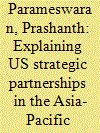

|
|
|
|
|
| Publication |
2014.
|
| Summary/Abstract |
Since the mid-1990s, strategic partnerships have emerged as a new form of alignment between states, particularly in the Asia-Pacific region. Yet only recently has the United States begun to pursue such relationships, especially under the Obama administration which has signed new partnerships with Indonesia, Vietnam, Malaysia and New Zealand. As a result, the current literature does not yet include significant study on how the United States views strategic partnerships. This article attempts to fill this gap by exploring the emergence of strategic partnerships as a new form of alignment in US strategy in the Asia Pacific under the Obama administration. Drawing on the existing literature on alignment, government documents, as well as conversations with policymakers from the United States and Southeast Asia, it argues that Washington is pursuing strategic partnerships as part of a deliberate effort to both enlist target countries to share the burden in addressing challenges and to institutionalize its relationships in the Asia Pacific. It constructs an original three-part analytical framework to understand how US policymakers conceive, craft and evaluate strategic partnerships in the Asia Pacific and applies it to analyse the similarities and differences in US partnerships with Indonesia and Vietnam.
|
|
|
|
|
|
|
|
|
|
|
|
|
|
|
|
| 2 |
ID:
076582
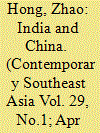

|
|
|
| 3 |
ID:
134032
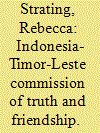

|
|
|
|
|
| Publication |
2014.
|
| Summary/Abstract |
International justice is characterized by the global articulation of basic human rights and peremptory norms outlawing crimes against humanity. In the twenty-first century, an international obligation of states to pursue individuals who bear responsibility for gross violations of human rights has formalized. Since the 1999 independence referendum, Timor-Leste has struggled to achieve substantive justice for the human rights violations committed during Indonesia's 25-year de facto administration. Timor-Leste provides a unique case study on the international dimensions of pursuing justice in a post-conflict transitional context, particularly as many alleged perpetrators of rights violations have been shielded by Indonesia. This presents a challenge for Timor-Leste in balancing its various international and domestic priorities: while domestic political order and rule of law necessitates the pursuit of substantive justice, Timor-Leste's external security interests require a positive relationship with Indonesia. This article examines the world's first bilateral Truth and Reconciliation Commission, the Indonesia-Timor-Leste Commission of Truth and Friendship. It then analyses the implementation of the Commission's recommendations by Indonesia and Timor-Leste. The paper argues that the Commission was primarily a political mechanism designed to support international priorities rather than substantive justice.
|
|
|
|
|
|
|
|
|
|
|
|
|
|
|
|
| 4 |
ID:
134034
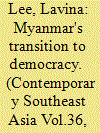

|
|
|
|
|
| Publication |
2014.
|
| Summary/Abstract |
In the mid-1990s, India faced considerable criticism for abandoning its strong support for pro-democracy forces in Myanmar. Instead, New Delhi chose to pragmatically engage the ruling military junta in order to pursue a number of key security, energy, economic and geostrategic interests that could not be achieved without its cooperation. The results of this change of approach have been modest, and as Myanmar transitions to democracy New Delhi hopes that new opportunities to progress these interests will emerge, rather than new obstacles. This article assesses whether a prospective National League for Democracy (NLD) led government will have the capacity to eradicate Indian insurgent groups (IIGs) operating in Myanmar's territory, be responsive to initiatives to expand trade between the two countries - particularly with India's northeastern states - and be more open to Indian investment. It argues that while the NLD is committed to greater economic liberalization and a closer economic relationship with India, Myanmar will not be an attractive market for Indian firms for some time (outside of the resource sector) until liberal institutions and open competitive practices are more firmly established. This article also argues that the NLD lacks a credible plan to bring an end to the country's long running ethnic insurgencies, and will not have the capacity to comprehensively crack down on IIGs.
|
|
|
|
|
|
|
|
|
|
|
|
|
|
|
|
| 5 |
ID:
134031
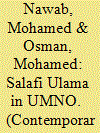

|
|
|
|
|
| Publication |
2014.
|
| Summary/Abstract |
The Salafi ulama (religious scholars) in Malaysia have seen their religious and political influence amplified over the last five years. Operating within a newly formed organization, the Pertubuhan Ilmuwan Malaysia (ILMU) and the newly augmented United Malays National Organization's (UMNO) young ulama wing, Salafi scholars play a key role in providing Islamic legitimacy to the government and defending it against the opposition Islamist party, the Pan-Malaysian Islamic Party (PAS). The decision by Salafi scholars to support the Malaysian government is striking given their hardline views on the implementation of Islamic laws and their opposition to democracy. This paper seeks to understand the reasons for the Salafi ulama's support for UMNO. It argues that the Salafi ulama's involvement in UMNO is due to a convergence of interest between the two groups and as part of a strategy by the Salafi ulama to expand their influence at both the state and societal levels. The paper examines the religious-political positions of the Salafi ulama on issues such as the Islamic state, the implementation of Islamic laws and democratic political system, and argues that they are opposed to the current state of religious affairs and the political structure of the Malaysian state. Nevertheless, the ulama are working within UMNO to change the political system. For UMNO leaders, the Salafi ulama form an important group that could defend the party against religious attacks from PAS and provide the party with greater religious credence.
|
|
|
|
|
|
|
|
|
|
|
|
|
|
|
|
|
|
|
|
|